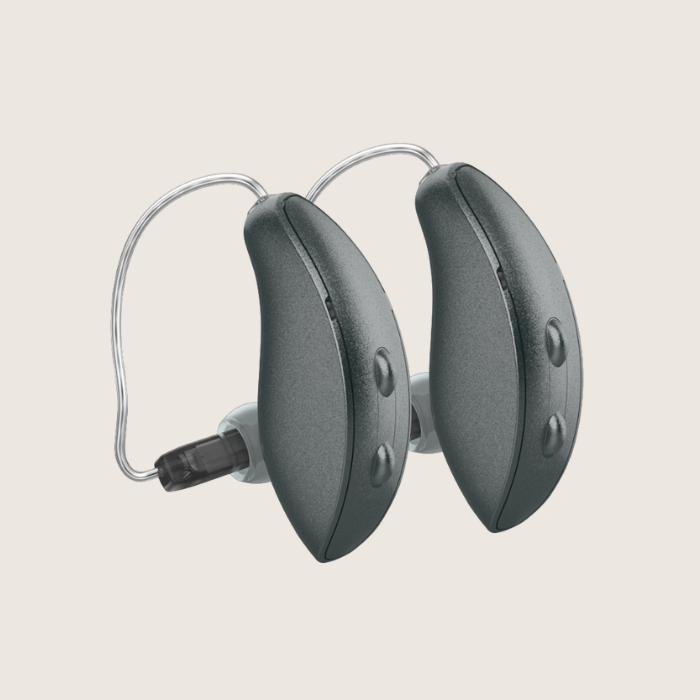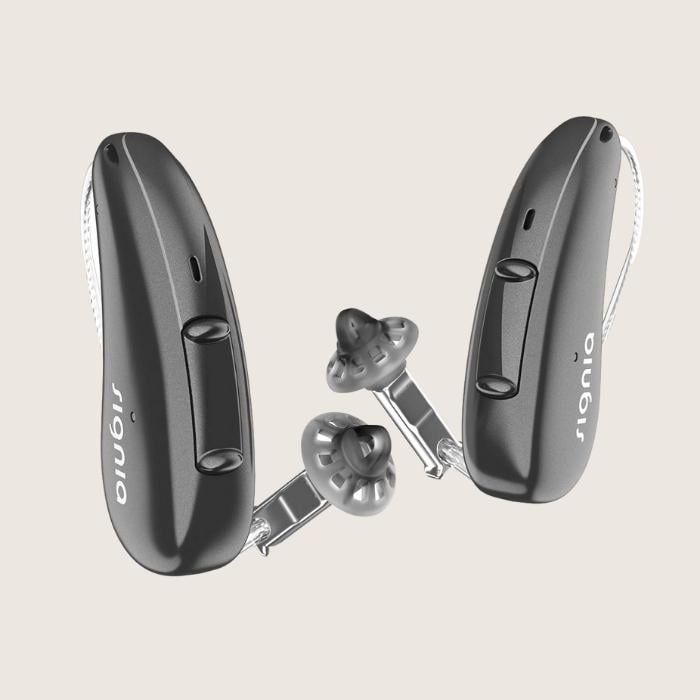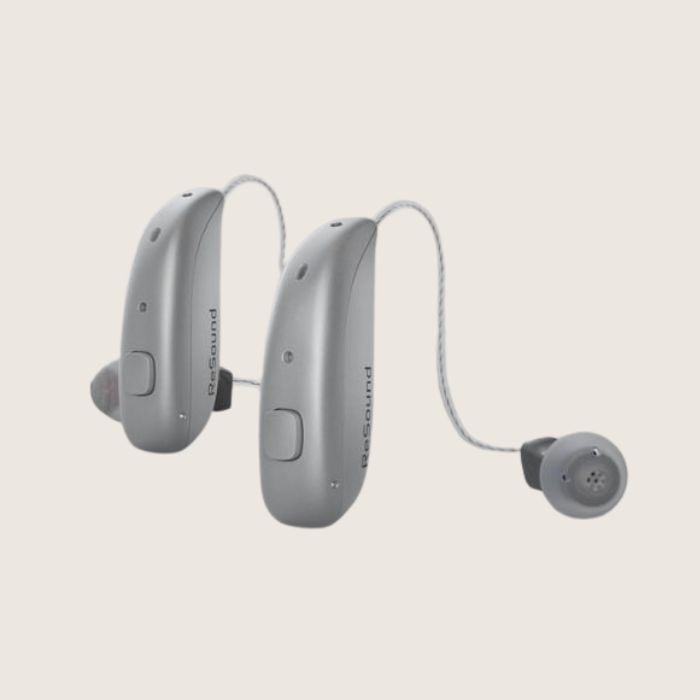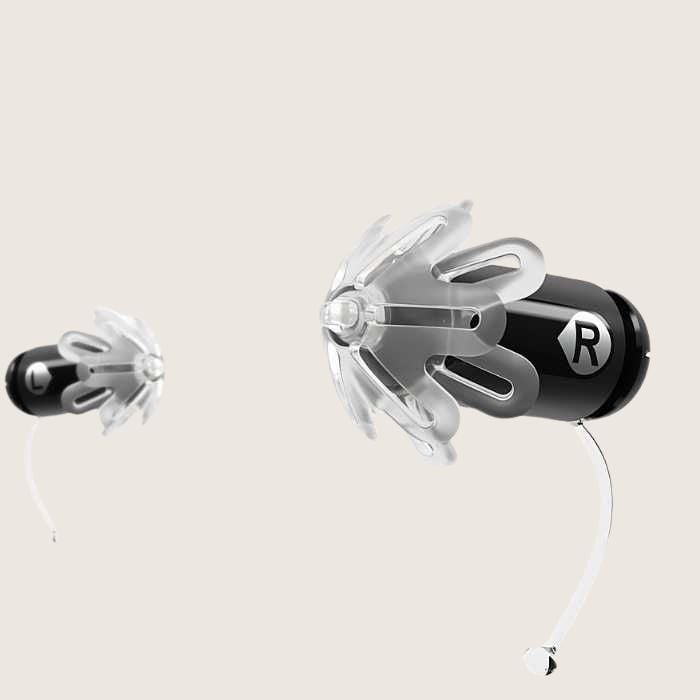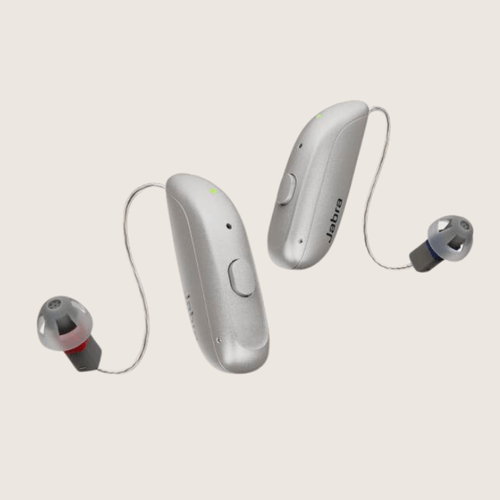Rechargeable batteries are officially mainstream from our phones to our AirPods and even our cars.
If you’ve had hearing aids for decades or are researching your first pair, you’re likely considering the pros and cons of rechargeable batteries.
You might also be searching for brands that offer the most extended battery life or the best recharging cases. In this guide, we’ll get to all of that and more. ⚡️
Prefer to watch?
Watch our quick breakdown of our rechargeable hearing aid research.
These are our top 5 rechargeable hearing aids for power, price and convenience. 👇
- 50+ hearing aid brands reviewed and rated by our team of hearing aid wearers and audiologists
- 200+ hours each month spent researching brands and care options
- 2,000,000 people shopped on Soundly in 2024
- 100% independently owned and operated
Read more about our company, services and process here.
Featured in this article
#1. Starkey Signature
At the time of this writing Starkey has an advantage when it comes to rechargeable batteries. Their behind-the-ear style device holds 51 hours of charge and their innovative in-ear custom device holds up to 36 hours of charge.
Starkey Edge AI
- Released October 2024 with sound processing and health tracking updates
- Improved sound control over previous Genesis AI models
- Enhanced health tracking features for comprehensive wellness support
- Longest-lasting rechargeable battery in its class
Starkey Edge AI takes the impressive Genesis AI platform and refines it, bringing even more functionality and ease to users. Here’s what makes it a standout choice:
- Top Battery Life – With over 50 hours on a single charge, Edge AI leads the industry for rechargeable hearing aids.
- Innovative Health Features – Includes health tracking, fall detection, and even real-time translation, pushing the boundaries of what hearing aids can do.
- Enhanced Sound Processing – Starkey has evolved “Edge Mode” into an all-day adaptive program, letting users benefit from smart sound adjustments seamlessly throughout the day.
Edge AI offers powerful tech with practical enhancements that support both hearing and health.
- Professionally programmed
- Long-lasting battery
- Smart health features
- U.S. based manufacturer
- Some find the Starkey app experience overwhelming
- Less audiologists are familiar with Starkey
- Costs $5,000 - $7,000 per pair
- Starkey Genesis AI is a fully customizable, prescription hearing aid appropriate for mild-severe hearing loss
- If you have severe hearing loss, your care provider may fit you with a custom earmold to reduce feedback
- If you have profound hearing loss, you may be a better fit for a BTE style (currently available in Starkey's previous generation, Starkey Evolv AI)
- Starkey Genesis is a prescription device fit and programmed by a professional
- After an initial fitting, you can connect with your care provider remotely through the Starkey app
- Starkey Genesis uses a deep neural network to effectively manage background noise. Starkey's devices are capable of making 80M adjustments per hour to match your environment
- Genesis AI's receiver-in-canal models are very comfortable for all-day wear. Your care provider will help you choose an earmold style that promotes comfort and effectiveness
- Starkey Genesis AI hearing aids sit behind the ear or inside-the-ear (read more on in-the-ear styles here)
- Genesis AI has a brand new futuristic design with smoother edges than previous models
- Choose between six faceplate colors: Brown, Chestnut, Medium Brown, Pink, Light Brown, and Black
- Starkey’s Genesis AI RIC RT is currently the industry’s longest-lasting lithium-ion rechargeable battery with up to 51 hours on a single charge (without streaming)
- The battery life is shorter, but still impressive at up to 41 hours with their smaller mRIC R style
- Starkey offers a disposable battery version of their devices with a 312 battery (changed every 7-10 days)
- Genesis AI allows Bluetooth streaming, music listening, and phone calls across all models. iPhone users can take calls hands-free, while Android users must keep their phones close to pick up outbound audio.
- Genesis AI uses Apple's MFI connection and Android's ASHA connection to stream content through Bluetooth
- Genesis is reasonably easy to handle but does require the wearer to place the hearing aid behind their ear and insert the receiver into the ear (consistent across all behind-the-ear styles)
- Genesis recharging case uses a non-traditional configuration which may take some getting used to
- Genesis AI is water resistant with an IP rating of 68
- This hearing aid can withstand dust and water submersion in one meter of water for up to 30 minutes
- Remote care: available through the app with care provider coordination
- Customization: Edge Mode and adjustments in the app
- Tinnitus masking: programs can be created by your hearing healthcare provider
- Find my hearing aid: yes
- Health tracking: activity tracking
#2. Signia Charge&Go
Signia Charge&Go earns the runner up spot with 41 hours of nonstop charge. Signia has a sleek AirPod-style recharge case that many wearers love.
Signia Charge&Go
- Excellent all-around sound processing—one of our top picks
- 39-hour battery life on a single charge
- Compact design: one of the smallest receiver-in-canal (RIC) devices available
- Custom-programmed by an audiologist at your local clinic
Signia Charge&Go is a standout for those seeking a well-rounded prescription hearing aid that combines advanced features, sleek design, and extended battery life. Here’s why we love it:
- Long Battery Life: With up to 39 hours of power (34 hours with streaming), it’s perfect for reliable, all-day use without constant recharging.
- Speech Clarity: Multi-beamforming technology sharpens speech even in noisy environments, helping users focus on conversations with ease.
- Advanced Features: Includes Own Voice Processing (OVP) and Bluetooth LE Audio for smooth streaming from both iOS and Android devices, enhancing audio quality.
- Comprehensive App Support: The Signia smartphone app offers fitness tracking, remote care (after the first appointment), and Signia Assistant, adding customization and convenience.
Customer reviews for Signia Pure Charge&Go are generally positive with nearly all customers celebrating crisp and clear sound. Some customers even report improvements in tinnitus using Signia's in-app tinnitus features. Like all hearing aids, some users find that adjustment to hearing more sound is a process. See more reviews from our partners at ZipHearing.
- "I can hear again!! No more asking people to repeat what they said, turn up the TV, or be staring blankly because I wasn't sure someone was addressing me. I can hear the water that I accidentally left running outside (old pipes in an old house). It's wonderful!!" - Mary
- "I LOVE my new Signia Pure Chareg&Go 5 IX hearing aids. I'm 81 and these are my first so I wondered if I'd have trouble adjusting to the sound or the aids. The answer is neither! The sound is very natural - I'm now hearing highs I haven't heard for decades. From the first day I've been wearing them for 16 hours per day and don't even know they're there." - Jeff
- "The sound quality is very good .Ive had chronic tinnitus for over a year and three months. I use ocean sounds for my therapy , it sounds like you are there. They are discrete and easy to wear . I have reduced my tinnitus by 65 to 70 percent In just about 3 months. Take the step , put in the time and results will follow." - Harly
- "Sound quality is very tinny but from what I've read, that is to be expected. I know my family and friends are happy to not be repeating themselves over and over again. It's very hard to review a product when you have nothing to compare it to." - Colleen
- Among the smallest body size on the market
- Second longest battery with 39 hours per charge
- Excellent in background noise
- Fully customizable with premium sound processing
- Only sold through local clinics at $3,198 - $7,000 a pair
- Does not include a Find My Hearing Aids feature
- Signia Pure Charge&Go is a fully customizable, prescription hearing aid appropriate for mild-severe hearing loss
- If you have severe hearing loss, your care provider may fit you with a custom earmold to reduce feedback
- If you have profound hearing loss, you may be a better fit for a high-powered BTE style hearing aid
- Signia Pure Charge&Go is a prescription device fit and programmed by a professional
- After an initial fitting, you can connect with your care provider remotely through the Signia app
- Signia uses a unique Split Processing technique helps isolate background noise and boost speech clarity
- Signia's Own Voice Processing (OVP) helps take the edge off of that uncomfortable sound quality of the user's own voice that many patients experience when adjusting to hearing aids
- Signia Pure Charge&Go comes in in a small and comfortable receiver-in-canal style that is easy to wear all day
- We prefer Signia's dome tips to other brands for comfort and performance
- Sits behind the ear with a receiver (speaker) that reaches into the ear canal
- Signia Pure Charge&Go is one of the smallest receiver-in-canal hearing aids on the market
- Choose between ten color schemes including: Black, Graphite, Dark Champagne, Silver, Pearl White, Fine Gold, Deep Brown, Sandy Brown, Rose Gold and Beige
- Choose between disposable and rechargeable batteries
- 36+ hours on a full charge
- Popular charger options: Portable charger with induction charging, or plugin Dry & Clean charger
- Signia Pure Charge&Go BCT IX uses Bluetooth Classic to connect with a wide variety of phones and devices
- Signia upgraded their connection strategy in 2025 and is now among the most connected hearing aids in the industry
- Signia Pure Charge&Go is reasonably easy to handle but does require the wearer to place the hearing aid behind their ear and insert the receiver into the ear (consistent across all behind-the-ear styles)
- Signia Pure Charge&Go uses a pin charger with magnets that makes daily charging fairly easy
- Signia Pure Charge&Go is water resistant with an IP rating of 68
- This hearing aid can withstand dust and water submersion in one meter of water for up to 30 minutes
- Signia Assistant: Built in app feature that uses natural language to prompt changes
- Remote care: Included in the Signia app (not a separate app)
- Customization: Treble/bass, volume, microphone directionality, Signia Assistant
- Tinnitus masking: Customizable options through your hearing care professional
- Find my hearing aid: Not available
- Health tracking: Step tracking, activity (e.g., high intensity versus low), and wear time
#3. ReSound NEXIA
ReSound NEXIA offers 30+ hours or battery power per charge and has a sleek conduction-charging case that we love.
ReSound NEXIA
- ReSound Nexia is one of the smallest RIC hearing aids available
- Auracast-enabled for seamless Bluetooth streaming, developed in collaboration with Bluetooth SIG
- Impressive 30-hour battery life on a single charge, ideal for all-day wear
- Strong performance in background noise, enhancing clarity in busy environments
- Custom prescription programming provided by a local audiologist
ReSound Nexia stands out for its legacy of innovation and modern design. Here’s what makes it a top pick:
- Proven Expertise: ReSound has led the hearing aid industry with tech-first developments, from the earliest made-for-iPhone hearing aids to today’s Auracast-enabled models. With millions of users worldwide, ReSound brings trusted experience and reliability.
- Discreet Design: NEXIA is the smallest receiver-in-canal (RIC) hearing aid we’ve reviewed, offering a low-profile option that’s especially helpful if you wear glasses or prefer subtlety.
- Powerful Battery: With 30 hours of life on a single charge and a portable charger, Nexia provides extended wear and convenience, ideal for users who are on the go.
- Superior Background Noise Handling: Nexia’s advanced beam-forming tech and innovative in-ear microphone deliver exceptional clarity in noisy environments, making it one of the best in the market for handling complex soundscapes.
ReSound NEXIA combines sleek design with high-performing technology, ideal for those who want both discretion and power.
ReSound NEXIA receives strong reviews for its crisp sound quality. Some users note issues with Bluetooth connectivity on Android devices and slight discomfort from the in-ear M&RIE receiver. Read more reviews via our partners at ZipHearing.
- "I had gotten so used to diminished hearing, I had no idea what I was missing. I no longer say “can you repeat that” or “what?” And my phone rings in my ear and all I have to do is tap the unit behind my ear. No more fumbling to get me phone out of my pocket in time to answer." - Richard
- "I love my new Resound Nexia 9. They seem to pick up sounds my previous 5-year old hearing aids picked up and they seem to process background noise much better. I am very happy with my purchase." - Mitch
- "My new Nexia “ears “ are very comfortable behind the ears. They seemed very loud at first but I have adjusted and are obviously better than my old “ears” . The sound is clear and less tinny . I can hear a phone conversation very clearly using the Bluetooth ability, although I still need my phone very close for the caller to hear me. After a day of wearing my “ears” the left one hurts, I think from the wire, however I have not had a follow up appointment so that may be fixable. The right side is no problem." - Fiona
- "The rechargeable battery is a HUGE plus—no more keeping batteries on me at all times. The moisture resistance is another plus—no more bulky desiccant case. The charging case is small enough to be easily portable, but might be a bit uncomfortable in a pocket—maybe in a jacket pocket. It took me a few days to figure out a good workflow for getting the hearing aids to connect and stay connected to my Pixel 5 (listed on the manufacturer's website as compatible). The connectivity is good when it works but sometimes one of the hearing aids drops out and has to reconnect. I was not able to get them to connect to my work computer (a MacBook) using MFi." - Matt
- Great for background noise management
- Auracast compatible
- Small form factor and an optional 3rd microphone in the ear
- 30-hours of battery life
- More expensive compared to direct to consumer and OTC options
- NEXIA's in-ear M&RIE microphone is a bit larger and can be uncomfortable for some
- ReSound NEXIA is a fully customizable, prescription hearing aid appropriate for mild-severe hearing loss
- If you have severe hearing loss, your care provider may fit you with a custom earmold to reduce feedback
- If you have profound hearing loss, you may be a better fit for ReSound NEXIA BTE
- ReSound NEXIA is a prescription device fit and programmed by a professional
- After an initial fitting, you can connect with your care provider remotely through the ReSound app
- ReSound NEXIA is an excellent choice for background noise management. The optional M&RIE microphone that sits inside the ear adds additional intelligence and reduces handling noise from your hair or glasses.
- NEXIA hearing aids come with four onboard microphones that anayze and manage background noise in the most complex situations.
- ReSound NEXIA is a discreet and comfortable product, but some users with smaller ear canals find the M&RIE receiver uncomfortable in their ears. M&RIE can be removed by your care provider and replaced with a standard receiver.
- ReSound NEXIA hearing aids sit behind the ear
- NEXIA is 25% smaller than past ReSound products and is one of the smallest behind-the-ear style devices on the market.
- NEXIA comes in 8 colors, including, sparkling silver, champagne, gold, bronze, warm grey, graphite, espresso, deep black
- NEXIA comes with three battery options, including micro RIE rechargeable (30 hours), a larger disposable battery version (size 13), and a second disposable battery option (size 312).
- A rechargeable version of NEXIA is also available with a CROS (for single-sided deafness)
- NEXIA is one of the first hearing aids on the market to release Auracast-compatible hearing aids. Auracast will take a few years to roll out in public spaces. Still, once it is available, it will allow users to stream public announcements, movies, and other shared audio experiences directly to their hearing aids.
- Of course, NEXIA also allows standard Bluetooth streaming from iPhone and Android devices. iPhone users can take calls hands-free, while Android users must keep their phones close to pick up outbound audio.
- NEXIA uses Apple's MFI connection and Android's ASHA connection to stream content through Bluetooth
- NEXIA is reasonably easy to handle but does require the wearer to place the hearing aid behind their ear and insert the receiver into the ear (consistent across all behind-the-ear styles)
- NEXIA recharging cases use conduction charging, which is easier to handle
- NEXIA has an app feature that uses your phone camera to check that the hearing aids are in the ear properly
- ReSound NEXIA is water resistant with an IP rating of 68
- This hearing aid can withstand dust and water submersion in one meter of water for up to 30 minutes
- Remote care: After an in-office activation, the remote care option is available on the app
- Customization: Volume control, treble/bass, streaming treble/bass, programs
- Tinnitus masking: Customizable programs with a hearing care professional or use the Resound Relief app to experiment with masking noise
- Find my hearing aid: Yes, feature is included in the app
- Check my fit: An app feature from Resound to check the hearing aids are in the ear properly
Read our full review of the ReSound App here.
#4. Eargo 7
Eargo offers the smallest rechargeable hearing aid on the market - it's not even that close. Each charge holds 16 hours of power, and Eargo's sleek induction charging case holds another two charges for on-the-go use.
Eargo
- Disruptive leader in hearing health, known for sleek, invisible design.
- Rechargeable with a patented tip that allows ears to breathe.
- Eargo 7 adapts to your environment throughout the day.
- Newer models (Eargo SE and Eargo LINK) offer a range of prices and features.
Eargo has long set the standard for design in the hearing aid industry. Their compact devices, along with an intuitive app and thoughtful packaging, make Eargo a standout choice for early adopters. Here’s why we picked it:
- Invisible Design: The Eargo 7 is the smallest rechargeable hearing aid on the market, rivaled only by the Sony CRE-C20.
- Reduced Occlusion: Eargo’s patented “floating” ear tip design sits comfortably in the ear without causing occlusion, a common issue for in-ear hearing aid users.
- User-Friendly App: The Eargo app is easy to navigate, and it allows audiologists to remotely adjust your devices as needed, though most adjustments can be managed directly in the app.
Eargo has received numerous customer reviews, reflecting a generally positive reception.
Overall
Customers frequently commend Eargo for its discreet design, sound quality, and responsive customer service. Many users highlight the significant improvement in their hearing experience and the comfort of the devices.
Positives
- Discreet Design: "The Eargo hearing aids are virtually invisible, and no one can tell I'm wearing them." — James D.
- Sound Quality: "The clarity of sound is remarkable; I can hear conversations clearly even in noisy environments." — Charlie B.
- Customer Service: "Eargo's support team was incredibly helpful and guided me through the setup process with ease." — Rowdy G.
Complaints
While the majority of feedback is positive, some customers have reported issues with device durability and the need for adjustments. However, these concerns are relatively infrequent compared to the overall satisfaction expressed by users.
For a comprehensive view of customer experiences, you can visit Eargo's review page.
- Eargo is a tiny, rechargeable device that sits entirely inside the ear
- Eargo uses a unique design that prevents occlusion
- Eargo is self-fit using an app but offers remote support
- Only appropriate for those with mild to moderate hearing loss
- Requires some tinkering to fine tune the product
- Eargo is not Bluetooth enabled due to the tiny size
#5. Jabra Enhance Select
Jabra Enhance Select doesn't have the most extended battery life on this list (still a respectable 30 hours), but they make the list for their overall value, which we think is among the best in the category.
Let's start with some background.
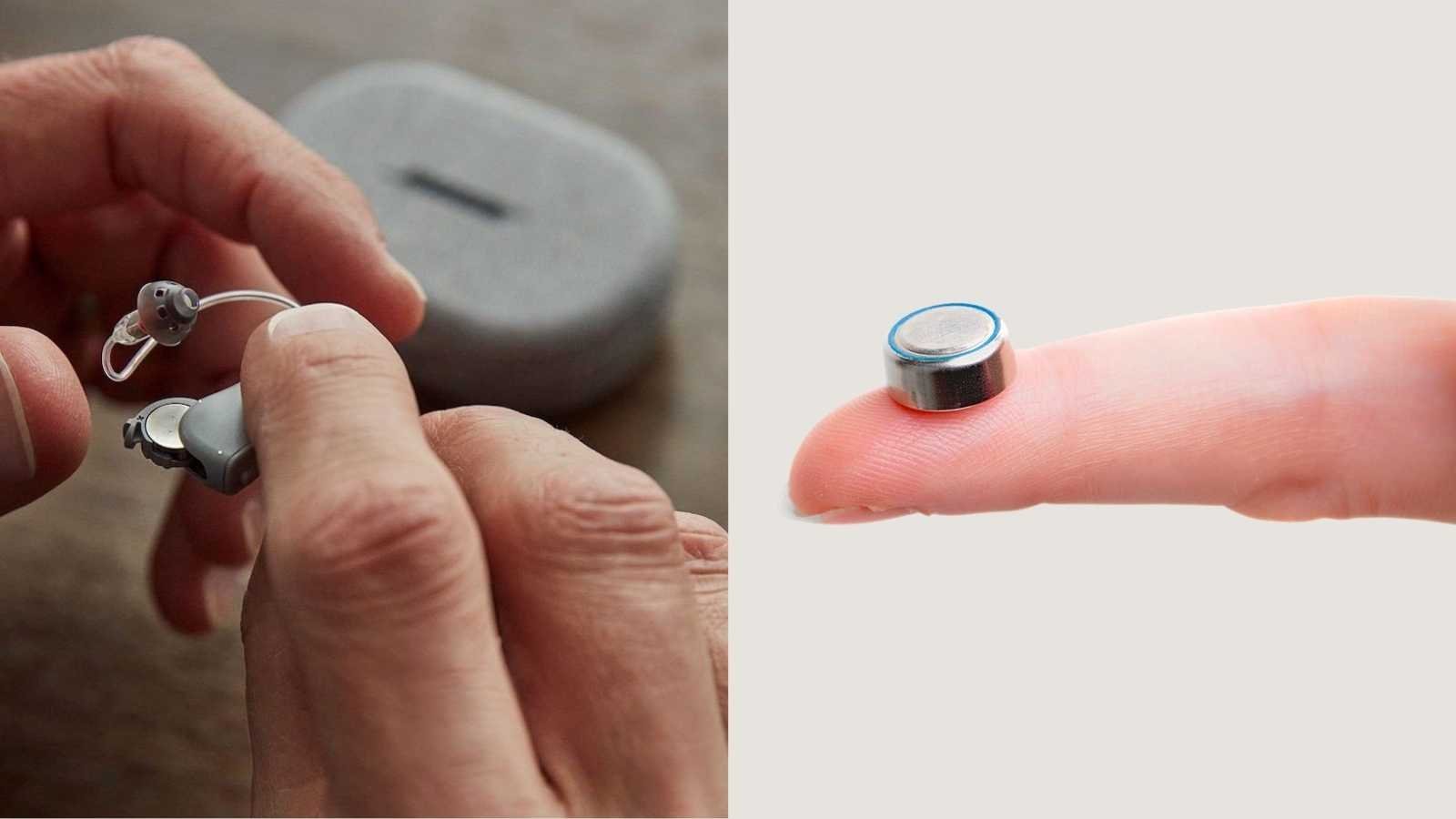
Just 10 years ago, nearly all hearing aids were powered by disposable batteries.
This type of battery, typically zinc air, requires oxygen to become activated. Once the battery is powered up, it can offer a steady stream of power for 3-10 days (depending on battery size).
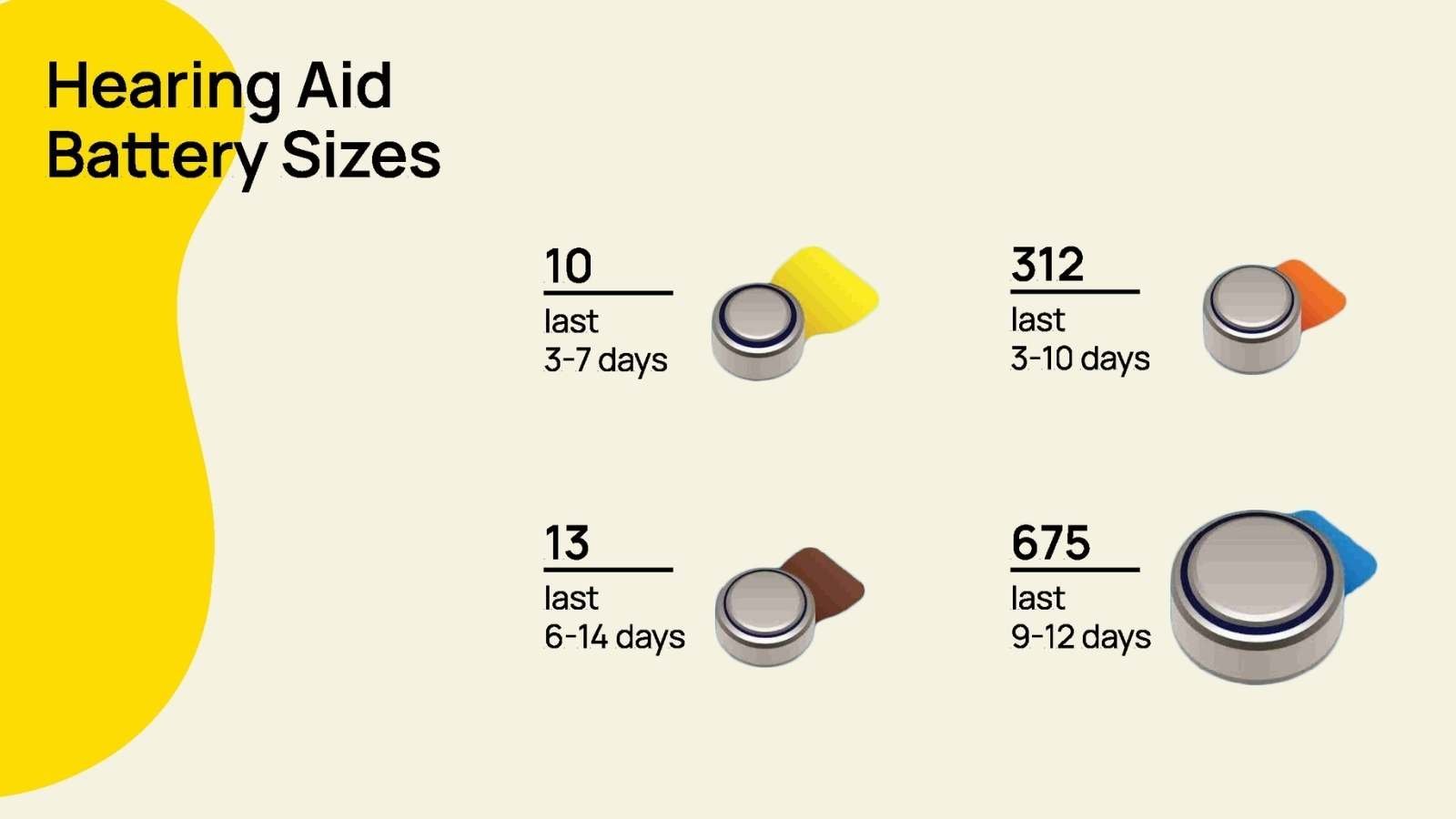
In the last few years, all leading hearing aid manufacturers have released devices with all-day rechargeable batteries. Today, most hearing aid wearers choose rechargeable when they purchase a new pair.
So is the decision clear-cut? Not necessarily.
Here are a few reasons that some hearing aid wearers still opt for disposable batteries.
Invisible hearing aids still use disposable batteries.
The first reason to choose disposable batteries is size. Most IIC and other small custom hearing aids do not come with rechargeable options at this time. However, Starkey has recently come out with
Disposable batteries give you more control.
I've had some patients who like to go camping regularly or desire reassurance that they'll have battery power in the middle of a Florida hurricane.
While most rechargeable batteries offer all-day power, If you forget to charge your device or run out of juice while away from home, you may have difficulty using it until you can re-access power.
Disposable batteries offer more straightforward repairs.
Suppose your rechargeable hearing aid loses battery capacity or needs a new battery for some reason. In that case, you'll likely need to ship your hearing aids off to the manufacturer and make do with a backup. Disposable battery-powered devices are less susceptible to these issues.
Rechargeable hearing aids are growing in popularity for some excellent reasons.
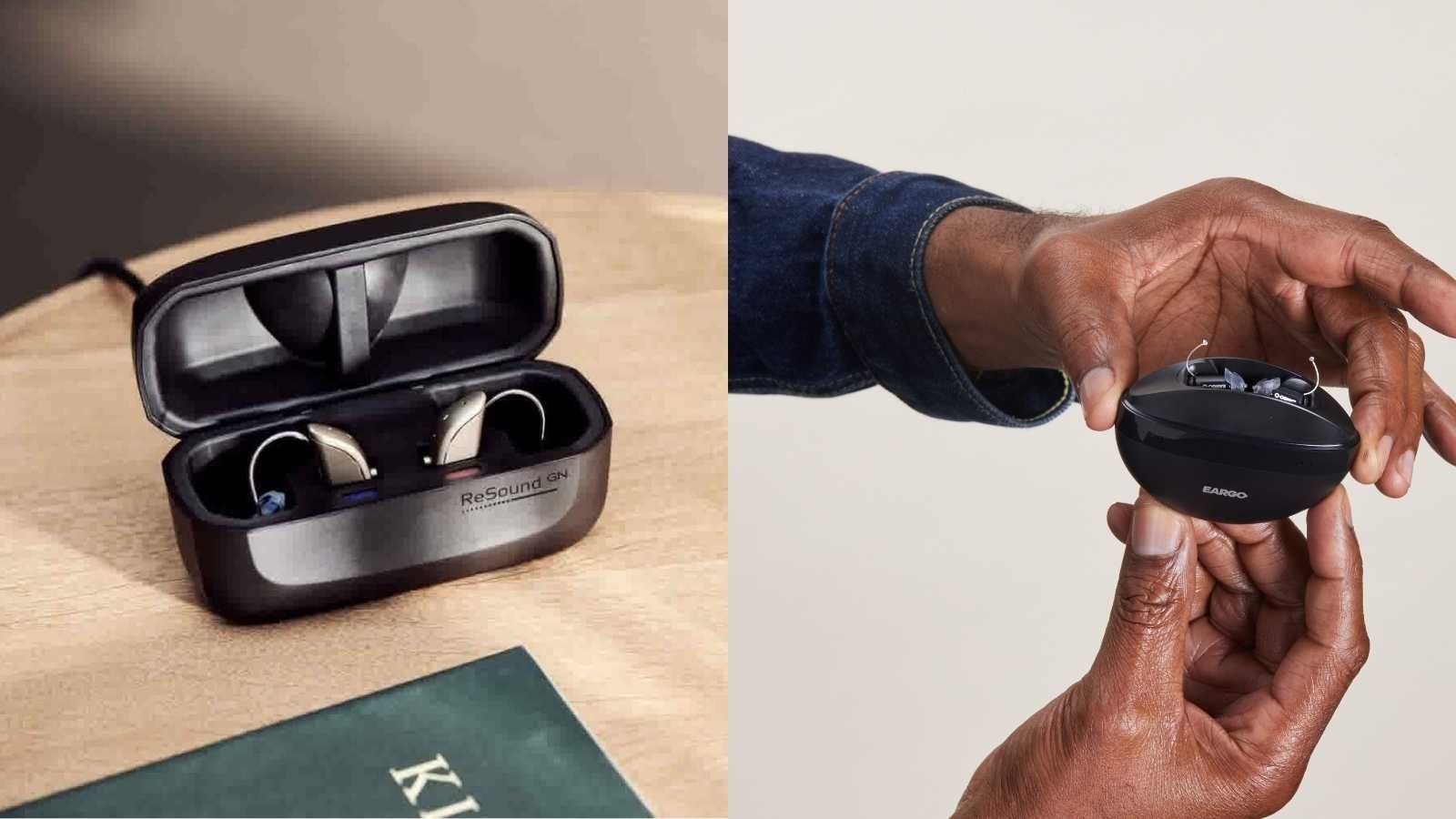
Rechargeable batteries have advanced in the last few years, with many holding a charge of 20 - 30 hours on a single charge. In addition, rechargeable batteries are easy to use, requiring only that they be placed in the charger each night. Recently, even superpower hearing aids have become available in rechargeable form.
Rechargeable hearing aids are now on the rise, providing numerous benefits that disposable batteries can't match.
Rechargeable batteries give access to more power.
Developments in artificial intelligence and sound processing technology have led to devices that require more battery power than ever before—making rechargeable forms much more efficient for long-lasting power.
Easy to use and better for dexterity challenges.
Modern rechargeable hearing aids are incredibly user-friendly, with the convenience of charging your device similar to that of charging a cell phone.
Dexterity is another essential consideration since rechargeable batteries require less fiddling with small parts.
Safer and better for the environment.
Rechargeable batteries reduce the number of hearing aid batteries that go to the landfill and can prevent dangerous ingestion of hearing aid batteries among pets and children.
Rechargeable batteries are more predictable.
Disposable batteries last 3-10 days, depending on their level of amplification, streaming, and use. They often give out in the middle of the day, leading to frustration and unpredictability. Rechargeable hearing aids return to the charger each night and offer full-day power each day.
What are the price differences between rechargeable and disposable batteries?
Generally speaking, the cost of rechargeable hearing aids is around $300-$600 more per pair. On the flip side, disposable batteries cost around $4-$5 per month.
Pros and Cons
The debate over rechargeable vs disposable batteries isn't going away anytime soon. Here's a summary of the pros and cons.
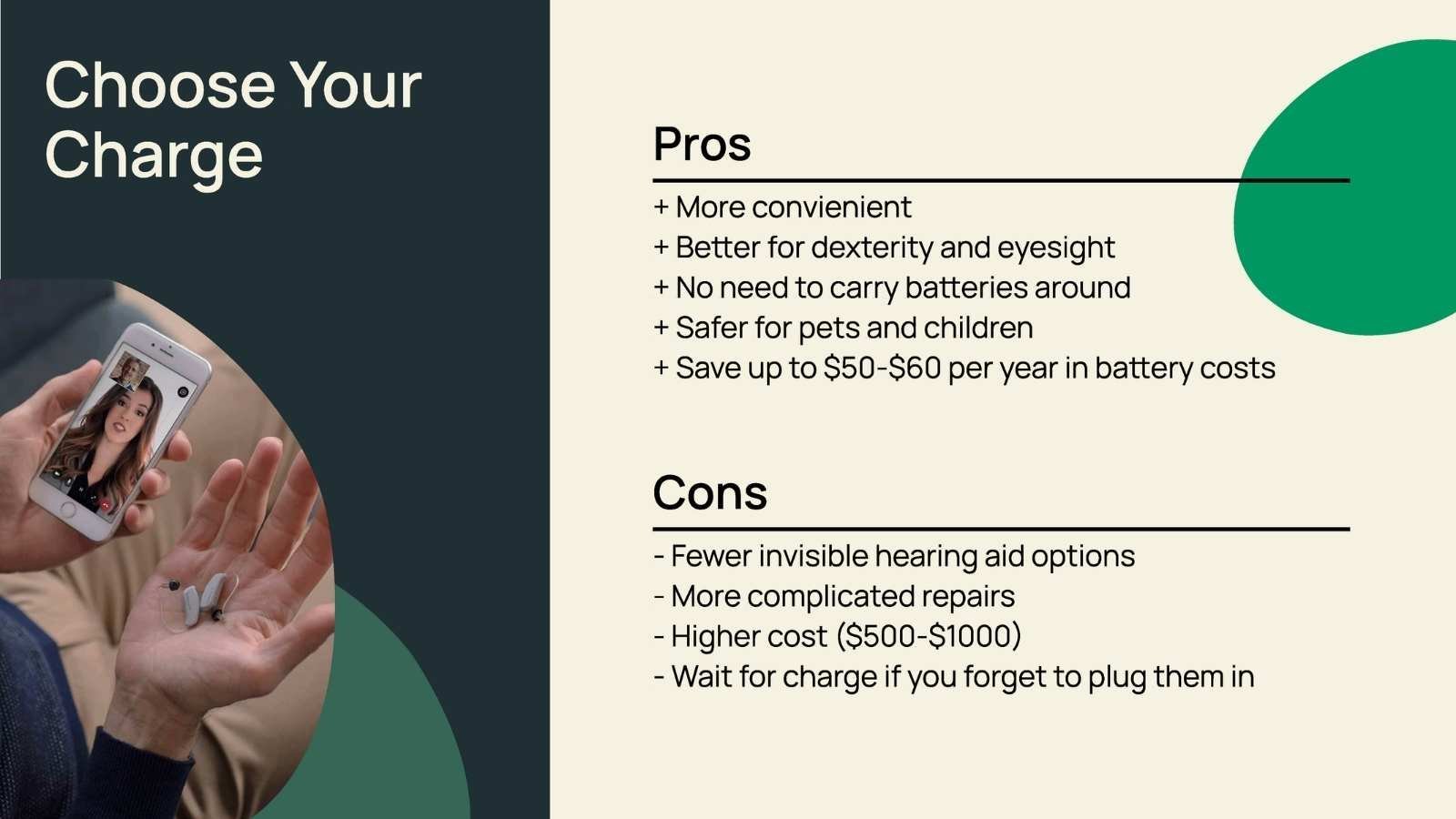
User Tips
If you choose disposable batteries:
If you opt for disposable batteries, you'll want to keep track of when you change your batteries. For example, note in your calendar when you expect a battery replacement. This way, you'll be prepared and not be out somewhere and suddenly lose battery power.
If you choose rechargeable batteries:
On the other hand, hearing aids with rechargeable batteries typically come with lithium-ion batteries that last a full day on a single charge. If you forget to charge your device or run out of juice while away from home, you may have difficulty using it until you can access power again. Create a daily routine of charging your hearing aids and recharge case each night while you sleep. Double-check your battery levels on your smartphone app before you leave the house for critical engagements.
Side-By-Side Comparison
Final Thoughts
There you have it! Some background on the raging debate between disposable and rechargeable batteries along with our guide to the best rechargeable products on the market at this time.
For those prioritizing reliability and long-term use, lasting rechargeable hearing aids offer a dependable solution, combining modern convenience with consistent performance.
Frequently asked questions
Rechargeable hearing aids have a non-removable battery embedded inside the device's body (much like your phone). Typically you will place your hearing aids in a particular charging case overnight to fully recharge the devices.
Rechargeable hearing aids can be an excellent choice for seniors who don't want to bother with regular battery changes. Disposable hearing aid batteries are tiny and difficult to replace for anyone with dexterity challenges.
Seniors with dexterity challenges should look for rechargeable hearing aids with a conduction charger versus a case with charging ports. Conduction charging means electric ports do not need to be connected in any particular fashion. ReSound, and Signia have great conduction chargers.
Most leading prescription hearing aids now function as Bluetooth hearing aids, offering both rechargeable batteries and Bluetooth connectivity. Lucid Engage and Sony CRE-E10 are the only major OTC hearing aids with rechargeability and Bluetooth streaming. Jabra Enhance Select is prescribed through telehealth and also offers both features.
This is one clear drawback of rechargeable hearing aids. If your rechargeable hearing aid battery stops working, you'll need to work with your hearing professional to send it back to the manufacturer. Most manufacturer warranties will cover hearing aid batteries for three years, but waiting for the repair and return can be frustrating. In this area, disposable batteries have an edge.
Rechargeable hearing aids usually cost anywhere from $200-$400 more per pair. Disposable batteries typically cost $5-$7 per month. Over a three-year lifespan, rechargeable batteries pretty much pay for themselves. Read our full guide on the topic here.
Each hearing aid manufacturer has their charging case (they are not interchangeable between brands). There are a few things to look for in a hearing aid charge case:
- Some cases must be plugged into the wall while they give your devices a charge. Others can hold a few charges portably before they need to be plugged back in (Starkey, ReSound, and Signia offer this option).
- As mentioned above, some chargers require the hearing aids to be "locked" in with little metal pieces in direct contact with the charger. More advanced models use conductive charging, which does not require direct contact with a metal piece. Conductive charging cases typically result in fewer failed charging sessions.
- Some brands like Starkey offer a "turbo charging" case which gives you a few extra hours of power with only a few minutes on the charging doc.
Hearing aids can support those with tinnitus by adding missing sounds and offering full-day masking sounds. Widex and ReSound are leaders in tinnitus management. Read our complete guide to tinnitus masking hearing aids here.
Costco currently offers three brands in their in-club clinics. All three products come standard with rechargeable batteries. Read our complete guide to Costco hearing aids here.
Many rechargeable hearing aids have an IP68 rating. This means they can take a quick dip without a problem. It is not recommended that you swim in hearing aids or keep them submerged for long periods of time regardless of their batter. Read more about waterproof hearing aids here.

